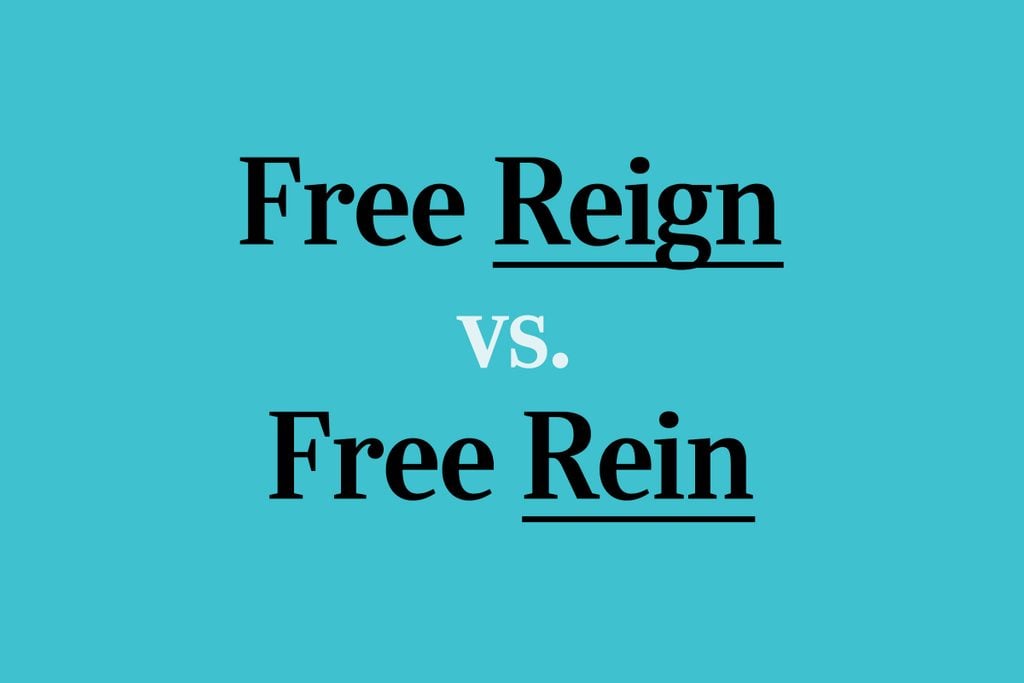Free Reign vs. Free Rein: Which Should You Use?
Updated: Sep. 25, 2023

Does this expression imply that someone with the freedom to do whatever they want is a ruler or a horse with no reins?
English is full of words that sound exactly the same, but are spelled differently and mean totally different things. These homophones are confusing enough when they’re on their own, but when they’re in popular phrases or expressions, a whole new layer of confusion is added. Consider “rein” and “reign.” (And, of course, there’s a third word that sounds exactly the same, too: “Rain,” as in the type of precipitation!) They sound similar, but mean totally different things—so when using the expression “free rein,” it can be tricky to know which to use. This is especially true because the meaning of the expression…doesn’t really make it obvious. These common English sayings actually make no sense.
What does the expression mean?
If someone has “free rein,” they basically have the freedom to do whatever they want. The expression is often followed by “to,” as in, “I have free rein to design the website” or “The substitute teacher gave the kids free rein to talk during class.”
First of all, what’s the difference between “reign” and “rein”?
We can’t dive into which word is correct until we clear up what each of the words means on its own, since they’re pretty easy to mix up. “Reign” is the word that we use when we’re talking about rulers—for instance, it’s the name of the Netflix show about Mary, Queen of Scots. It describes the tenure of a ruler—Queen Elizabeth II’s reign has lasted 68 years. It’s also the word we use when talking about a “reign of terror.”
As for “rein,” it’s the word that describes the straps that restrain a horse. “Reins” can also refer to metaphorical restraints or constraints, and it can be used as a verb, as in: “Rein in your enthusiasm.” Check out these other common pairs of words everyone confuses.
So which is it?
Well, just looking at those definitions, it certainly seems like “free reign” would be the correct word. If you have total control, it makes way more sense to say you’re reigning, right? In fact, “free rein” seems like an oxymoron! And yet, “free rein” is the correct expression.
The figurative expression dates back to the 17th century, but its true origins date back even further—and to horseback riding. Riders would give their horses “free rein,” literally, by holding the reins loosely to allow the horse to chart its own course. This had evolved into the figurative expression, no physical reins required, by the 1630s.
However, the mistake of using “free reign” is very common—so common that it’s popped up in many legitimate sources, including Travel Weekly and the MLB, perpetuating the confusion. And yet, if you want to get technical, there is a reason “rein” makes more sense than “reign” here. As Merriam-Webster explains, people who use the phrase “are referring to the freedom granted to them to do as they choose—and not to their power as a ruler to do so.” This is saying that, well, anyone who’s “reigning” automatically has “free rein.” “Free rein” refers more to a freedom that is granted. So basically, while “free rein” might sound like an oxymoron, “free reign” is actually redundant, and therefore not the correct expression. Next, check out more common words and phrases you’re using all wrong.
Sources:
- Merriam-Webster: “‘Free rein’ or ‘free reign’?”
- Grammarist: “Free rein vs. free reign”
